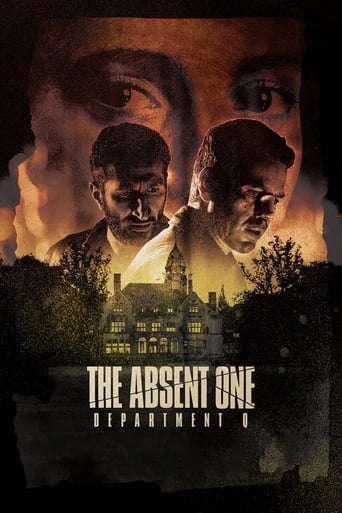Curapedi
I cannot think of one single thing that I would change about this film. The acting is incomparable, the directing deft, and the writing poignantly brilliant.
StyleSk8r
At first rather annoying in its heavy emphasis on reenactments, this movie ultimately proves fascinating, simply because the complicated, highly dramatic tale it tells still almost defies belief.
Neive Bellamy
Excellent and certainly provocative... If nothing else, the film is a real conversation starter.
Frances Chung
Through painfully honest and emotional moments, the movie becomes irresistibly relatable
Alrik Daldrup
Nowadays, Jussi Adler-Olsen is probably the most successful Danish thriller writer with his latest book 'Selfies' (which is, in my opinion, very weak, but that's another point) again on the best- seller list. 'The Absent One' is the second installment in the Department Q film series originally released in 2008. Like its predecessor the film is directed by Mikkel Norgaard who reunites with the lead stars Kaas and Fares. After a former cop commits suicide leaving behind the unsolved case of the brutal killing of his two children the lugubrious detective Carl Morck and his kind assistant Assad begin to investigate. Their only trace is a call by a girl, Kimmie Larsen, from the boarding school nearby the place where the assault happened. She leads the detectives to a group of powerful and affluent men headed by the famous Ditlev Pram who is ready to do whatever it takes to come to terms with the past. Therefore, the plot again alternates between the 1990s (Kimmie, Ditlev and the others) and the 2010s (the investigation).First of all, the big plus of the film is the menacing and saturnine atmosphere it creates – among the thrillers, only Stieg Larsson's Millennium trilogy features a deeper gaze into the abyss. Ditlev, the leader of the group, is a sadistic and Mephistophelian psychopath who loves to destroy others. In the present, it is the world in which Kimmie lives that is full of gloom. She has psychic problems and her only friend is a drug addict. There is almost no light and fun in the world of Department Q and the disturbing opening scene already sets the tone. The big threat in form of Ditlev and his henchmen creates a chilling and tense effect and therefore, you want to see how our very favorite detective duo (hopefully) will give these monsters what they deserve. Since the film depicts brutality, torture and rape, 'The Absent One' is not for the faint-hearted. What I also liked about the story is how it deals with the character of Kimmie, the girl who calls the police during that murderous night. She is somehow a round character: On the one hand, she liked the violent behavior of Ditlev and had also fun to beat others to death. Nonetheless, she made the call and realized that they have crossed some lines. There is somehow a change in her attitude towards Ditlev (of course, we learn why but I will not spoil it) which is the reason why Carl wants to help here, although she is as guilty and as criminal as the others. Consequently, Kimmie is not just another boring insane killer, but she shows that there is not always black and white, good and evil in the world. Kimmie is a shade of gray and this makes her an interesting character. Furthermore, humor would have been important to give some variation in all this violence. There are some humorous comments especially by Carl but there could have been more. This is something which the next film does better. Concerning certain cinematic devices, beside the use of light and dull colors the score by Johan Söderqvist, Patrik Andren and Uno Helmersson reflects the darkness of the film too. The haunting leitmotiv which appears often during the film underlines the deep pain the characters' live(d) through, while Kimmie's theme has some beauty and warmth in it. I'm glad that there is a soundtrack album out! Nikolaj Lie Kaas and Fares Fares are a well-interacting team. Particularly noteworthy is how Kaas plays Morck with almost no happiness or smiling on its face which emphasizes how much he suffers from his job and the attack on him and his colleagues at the beginning of The Keeper of the Lost Causes. Danica Curcic who plays the present day Kimmie gives a similarly strong performance, while Johanne Louise Schmidt as Rose is a refreshing new member of the team. Pilou Asbæk plays the main antagonist and psychopath Ditlev who sticks at nothing to save himself. Well-known for his work in 'Borgen' he gives Ditlev a dangerous and unpredictable arrogance. Overall, 'The Absent One' features a typical Scandinavian well- interwoven thriller plot full of vengeance, revelations and some scary crimes. There is nothing veritable new in the genre of the Scandinavian crime thriller – the depressive coat-wearing detective or the different detective duo are tried and trusted ingredients. Nevertheless, Norgaard uses the literary source well, although it has some clichés. In short terms, the film is more emotional and fast-paced than 'The Keeper of the Lost Causes' and therefore a nerve-racking thriller!8 pts.
tenshi_ippikiookami
The second movie based on the Department Q's novels is an entertaining affair, but with zero originality and too long to really satisfy.A drunken man jumps into the path of Carl Mørck when he is going home and asks him about some documents he sent him. Carl ignores him and tells the drunken man to go home. A couple of hours later, the man is death, having committed suicide. On a table, a box with lots of information he had been gathering through the years. The man was a retired policeman, and the case he was talking about the death of his two children. Carl Mørck becomes obsessed with finding the truth."The Absent One" is not a bad movie. It has good atmosphere, a nice pace and the acting passes the bar. We will care for Assad and Carl, a couple of policemen with very different personalities that compliment each other (of course). However, the movie relies too much on flashbacks to explain parts of the story and how the events unfolded. On top of that, there is little mystery and the level of tension could have been higher: we have seen too many times the story of straight policemen trying to catch very bad very rich people that have too many friends in the right places. This doesn't stop, though, the movie from being absorbing enough. It will probably be enjoyed the best by fans of the books or the genre.
Reno Rangan
A follow up to 'The Keeper of Lost Causes' based on the Danish crime-thriller novel of the same name in the original language. That one was a classy, a brilliant initiation in the 'Department Q' series. One of the best Scandinavian detective movie I have ever seen. I expected same energetic, caliber and suspenseful in this as well. But marginally disappointing, yet it stood and delivered to the previous film's standard.In this second episode, it was a murder mystery for Carl and Assad to crack it down. They did not choose it, the case did. It was a long pending affair in the department, since then the world has changed a lot. But the father of twins murdered who investigated privately leaves all the required evidence to the Department Q team. Now, where these two deeply dedicated detectives begin, how they dig it and whether they reach the other end of the investigation to uncover everything is the rest of the film.With a new target in the hands, the Department Q world expands further bigger than the first film. Takes us to the two decades earlier and narrates some of the key events by introducing new characters. So it also creates curiosity about the happenings around and sufficient suspense where it all went wrong. The prediction was not that hard, but without a clear picture of what happened, I simply failed to make a guess as I do always. The story holds everything back, that's a weak point, but very gripping with those thrilling going after scenes."I never met anyone as destructive as him."Too much of flashbacks might be the reason for movie to lose the original appeal. It reduced Carl and Assad's screen-space. It was good for this particular plot to develop the story and characters, but did not help what Department Q theme is known for. That was not at all, certainly it was a good story, I'm not arguing with that, but the presentation was not charming enough and the dearth of fine action sequences was a little setback which was absolutely necessary in the cop themed films.The movie was shot very well with maintaining the same tone from the first, along great performances by everyone. The difference between Carl and Assad remained, we should say it was maintained as it should be. In any two buddy cop movies, they are always antipodal characteristic. It was like a cliché, but brings the better outcome. These two guys together form a best homicide team in Copenhagen police department. Now the third character introduced in this part, a secretary who loosely hangs around, but out of the league from the perspective of story narration.Very much a Danish's answer to the Swedish's 'Dragon Tattoo' films. But in a way the two are not a comparable, if you do, then this one lacks in a long way. Because of the type of cop works are different with completely different universe and environment. After the first two films the director has changed for the third film, which is set to hit the screen in 2016. Hoping for 'A Conspiracy of Faith' to do much better than this one, because many more to follow if that succeeds.7½/10
s3276169
This is the second film installment that I am aware of in this detective drama, following on from "The Keeper of Lost Causes". At first glance the translated title, "Killer of Pheasants", seems somewhat misleading. In fact, its well chosen. Pheasants demonstrate sexual dimorphism. That is the males are brightly coloured, whilst the females are plain. The wealthy male sexual predators at the heart of this tale, like male pheasants, appear to have everything. They lead bright, shining, seemingly flawless lives. By contrast, their female collaborator turned victim, suffers a bleak life of dispossession, but as we see she is, ultimately, a better human being. Indeed, this story is, arguably, as much about dispossession, as it is a crime story. It speaks to the destructive power of inequality and how money not only does not remedy human flaws but can, in fact, amplify them. Of course, its also a good crime thriller, with many subtle and often oblique, plot shifts. It takes time for all the intricate pieces of the crime puzzle to come together but when they do, its a very satisfying experience. The acting is outstanding. Nikolaj Lie Kaas skillfully reprises his role as Carl Morck. A socially awkward, self destructive but nonetheless brilliant, driven detective. Fares Fares returns as his long suffering but understanding partner, Assad. The comfortable chemistry between these two lead actors makes this film easy viewing. The other cast members, including the key villains of the piece, are well chosen and able actors who fit snugly into their respective roles. For some people, possibly the only shortcoming, may be the sexual violence inherent in the film. If you are of a sensitive disposition you may want to give this film a pass. That said, if you are not perturbed by the violence or the subtitles, this film is a must see. Ten out of ten from me.

